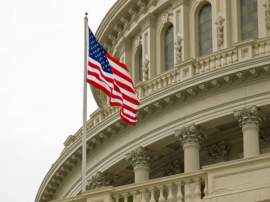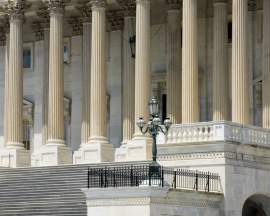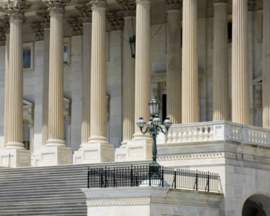
Provisions For Filling Vacancies

Popular In Constitution
Purpose Of Lifetime Appointment And Pros And Cons Enumerated Powers Bicameral Legislature Background Article 3 Of The Constitution We The People 1st Amendment Who Wrote The Constitution Judicial Review Equal Protection Clause 5th Amendment 10th Amendment Three Fifths Compromise
The House of Representatives will, in extenuating circumstances, be subjected to having vacancies in its seats. This may happen due to several instances, such as death, resignation, or a refusal to serve. Vacancies can often occur when members of the House get appointed to other positions outside of Congress, such as election to the Presidential office or to the position of Vice President. Another circumstance that can occur is if a Representative is removed from his/her position due to expulsion. Under the United States Constitution, it is required that the vacancies in the House of Representatives be filled by special elections.
The provisions for filling vacancies in the House
of Representatives can be found in Article I, Section 2 of the Constitution.
Clause 4 of Section 2 states: "When Vacancies happen in the Representation
of any State, the Executive Authority thereof shall issue Writs of Election to
fill such Vacancies."
By Constitutional law, the House of
Representatives is not delegated the responsibility of filling vacancies. The
responsibility and duty to provide for a vacancy rests on the State that has a
vacant seat in their representation in
the House. The
Constitution requires that vacancies in the House be filled by special
elections. However, it is important to note that there are no provisions
regarding filling such vacancies in a temporary fashion, such as with interim
Representatives. Those that are to be considered in such a special election
must also meet all of the eligibility requirements set forth in the
Constitution under Article I, Section 2 (See Also: Election and Qualification
Special elections regarding vacancies in the House
of Representatives are the responsibility of the States. The actual scheduling
of a special election will vary from State to State, as each has its own
regulation and provisions regarding special elections. Furthermore, the time at
which the vacancy occurs can also have an impact on the scheduling of a special
election.
Vacancies in the House occurring during the first session of Congress are predominantly filled through special election. Many states provide for a certain amount of time after the vacancy occurs to provide for nomination procedures and the special election to be held. For the most part, most states will hold the special election on the next regular election day for convenience purposes. However, when a vacancy occurs during the second session of Congress, procedures will differ on a different scale.
Much is dependent on the time the vacancy occurs and when the next general election is scheduled. Furthermore, another aspect to be considered is when the term of a current Representative is to be over, which will, in effect, determine the next general election date. Therefore, it is possible for a seat in the House of Representatives to be vacant for quite a period of time. An example would be if a seat becomes vacant three months before the Representative's term was to end. Many seats will simply leave the seat vacant and forgo a special election, for the regular election is already scheduled to occur in the near future.
NEXT: Salary, Benefits, and Titles



















